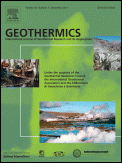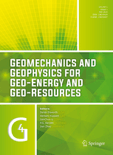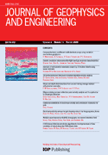
GEOTHERMICS
Scope & Guideline
Unveiling cutting-edge methodologies in geothermal applications.
Introduction
Aims and Scopes
- Geothermal Resource Assessment:
The journal publishes studies on the geological, geochemical, and geophysical assessment of geothermal resources, including the characterization and modeling of geothermal reservoirs. - Enhanced Geothermal Systems (EGS):
Research on EGS is a core area, focusing on techniques for improving reservoir performance, including hydraulic stimulation, thermal and hydraulic modeling, and the impact of geological structures. - Geothermal Energy Applications:
The journal covers diverse applications of geothermal energy, including district heating, geothermal power generation, and innovative uses in agriculture and industry. - Thermal-Hydraulic Modeling:
A significant emphasis is placed on numerical and analytical modeling of thermal-hydraulic processes in geothermal systems, which aids in understanding heat transfer mechanisms. - Environmental Impact and Sustainability:
Papers addressing the environmental impacts of geothermal energy extraction and strategies for sustainable development are regular features, emphasizing the need to balance resource utilization with ecological protection. - Technological Innovations:
The journal also highlights advancements in geothermal technologies, including drilling techniques, heat exchanger designs, and energy storage systems. - Geochemical Studies:
Research on the geochemical properties of geothermal fluids and their interactions with geological formations is a vital area of study, providing insights into reservoir behavior and potential scaling issues.
Trending and Emerging
- Machine Learning and AI in Geothermal Studies:
The application of machine learning and artificial intelligence for predicting geothermal reservoir behavior and optimizing energy extraction processes is increasingly prevalent, indicating a trend towards data-driven methodologies. - Sustainable and Green Geothermal Technologies:
There is a growing emphasis on sustainable practices and technologies in geothermal energy, including the integration of geothermal systems with other renewable sources and energy efficiency measures. - Geothermal Energy and Climate Resilience:
Research linking geothermal energy utilization with climate resilience strategies is emerging, focusing on how geothermal systems can contribute to sustainable development goals. - Geothermal Lithium Extraction:
The exploration of geothermal brines for lithium extraction has gained significant attention, reflecting the growing demand for lithium in energy storage technologies. - Advanced Geothermal Reservoir Modeling:
Innovations in modeling techniques, including the use of coupled thermal-hydraulic-mechanical models and high-resolution simulations, are trending, enabling better predictions of reservoir performance. - Public Perception and Acceptance of Geothermal Energy:
Studies examining public perception and acceptance of geothermal energy projects are becoming more common, highlighting the importance of social factors in geothermal development. - Geothermal Resource Recovery and Reinjection Techniques:
Research on the recovery of geothermal fluids and reinjection methods is trending, focusing on enhancing the sustainability and efficiency of geothermal systems.
Declining or Waning
- Low-Enthalpy Geothermal Systems:
There has been a noticeable decrease in research focused on low-enthalpy geothermal systems, possibly due to the increasing interest and funding directed towards high-enthalpy systems and enhanced geothermal systems. - Geothermal Utilization in Agriculture:
Papers specifically addressing the application of geothermal energy in agriculture are becoming less frequent, indicating a possible shift in focus towards more industrial applications or other renewable energy sources. - Traditional Geothermal Resource Exploration Methods:
The reliance on traditional geological and geophysical exploration methods appears to be waning, as newer technologies and methodologies, such as machine learning and advanced numerical modeling, gain traction. - Geothermal Policy and Regulation Studies:
Research focusing on the regulatory and policy aspects of geothermal energy development has decreased, suggesting a shift towards more technical and scientific investigations. - Geothermal Energy Economics:
Although still relevant, the specific focus on economic analyses of geothermal projects has become less prevalent, possibly overshadowed by technological and environmental discussions.
Similar Journals

Bulletin of the Tomsk Polytechnic University-Geo Assets Engineering
Pioneering Research for a Greener TomorrowBulletin of the Tomsk Polytechnic University-Geo Assets Engineering is a prestigious open-access journal published by the TOMSK POLYTECHNIC UNIV, PUBLISHING HOUSE, dedicated to advancing knowledge in the fields of economic geology, fuel technology, and geotechnical engineering among others. With an ISSN of 2500-1019 and an E-ISSN of 2413-1830, the journal has achieved a notable position in the academic landscape since its inception in 2015, as evidenced by its Q3 quartile rankings across various categories in 2023, including Environmental Science and Materials Science. This journal provides a vital platform for researchers and professionals to disseminate cutting-edge findings, contribute to innovative practices, and engage in meaningful discourse regarding geo assets and their management in the context of contemporary environmental challenges. While the journal continues to grow in impact, it remains accessible to a wider audience, promoting sustainability and responsible resource management. Researchers, industry experts, and students will find valuable insights and the latest developments relevant to these dynamic fields through its comprehensive and rigorous peer-reviewed articles.

International Journal of Energy and Environmental Engineering
Advancing Knowledge at the Intersection of Energy and EnvironmentInternational Journal of Energy and Environmental Engineering, published by SPRINGER HEIDELBERG, is a leading platform for innovative research in the fields of energy and environmental engineering. With an ISSN of 2008-9163 and an E-ISSN of 2251-6832, this journal is dedicated to advancing knowledge and technology that intersects both energy and environmental disciplines. Recognized in the Q2 category for 2023 in both Energy (miscellaneous) and Environmental Engineering, this interdisciplinary journal aims to address global challenges in energy sustainability and environmental protection. The journal also boasts strong Scopus rankings, standing at Rank #73 in Environmental Science and Rank #28 in General Energy, highlighting its influential role within the academic community. Researchers, professionals, and students are encouraged to contribute and engage with cutting-edge studies that push the boundaries of knowledge and innovation in energy and environmental engineering.

Renewable Energy Research and Applications
Pioneering Research for a Clean Energy RevolutionRenewable Energy Research and Applications is an esteemed academic journal published by Shahroud University of Technology, dedicated to advancing the field of renewable energy and its diverse applications. Since its inception in 2020, this Open Access journal has provided a platform for publishing innovative research that addresses the critical challenges and opportunities within the renewable energy sector, including solar, wind, hydro, and biomass energy. With an ISSN of 2717-252X and an E-ISSN of 2676-7430, the journal aims to disseminate high-quality research findings that inform policy makers, researchers, and practitioners worldwide. By fostering collaboration and knowledge exchange, the journal plays a vital role in the ongoing transition towards sustainable energy solutions, making it an essential resource for anyone committed to this urgent global challenge.

CT&F-Ciencia Tecnologia y Futuro
Connecting ideas for a sustainable world.CT&F-Ciencia Tecnologia y Futuro, a distinguished open-access journal published by ECOPETROL SA, serves as a vital platform for the dissemination of innovative research and advancements in the fields of chemical engineering, energy, fuel technology, and the broader disciplines within the geosciences. Established in 1996 and operating continuously until 2023, this bilingual journal aims to foster collaboration and knowledge exchange among researchers, professionals, and students in Colombia and beyond. With an increasing emphasis on sustainability and renewable energy, CT&F aligns with contemporary academic priorities and societal challenges. Although currently ranked in the Q4 category across multiple disciplines, the journal remains committed to enhancing its impact and accessibility, providing researchers with valuable insights and a significant forum to share their findings, all under the auspices of open-access since 2009. Explore a wealth of research as you contribute to the ongoing dialogue shaping the future of science and technology.

Geomechanics and Geophysics for Geo-Energy and Geo-Resources
Advancing knowledge in geo-energy and resources.Geomechanics and Geophysics for Geo-Energy and Geo-Resources, published by SPRINGER HEIDELBERG, is an esteemed open-access journal dedicated to advancing the field of geo-energy and geo-resources. With an ISSN of 2363-8419 and E-ISSN of 2363-8427, the journal welcomes contributions that explore innovative research in geomechanics, geophysics, and their applications in energy and natural resource management. Since its inception in 2015, and now enjoying open access status since 2023, it has established itself within renowned quartiles in several categories, including Q1 in Geophysics and Q2 in Economic Geology, marking it as a prominent platform for high-impact research. The journal is intrinsically linked to the interdisciplinary nature of energy studies, making it a critical resource for professionals, researchers, and students interested in the sustainable harnessing and management of geo-resources. With strong rankings in Scopus, including Rank #25 in Geophysics, it is positioned to offer valuable insights that push the boundaries of understanding in this vital domain.

International Journal of Renewable Energy Research
Pioneering pathways to a sustainable energy future.International Journal of Renewable Energy Research (IJRER) is a distinguished peer-reviewed journal dedicated to advancing the field of renewable energy through innovative research and comprehensive analyses. Published by the esteemed INT JOURNAL RENEWABLE ENERGY RESEARCH, this journal has established itself as a vital resource for academics and industry professionals alike since its inception in 2011. With a focus on a wide array of topics in Energy Engineering and Power Technology and Renewable Energy, Sustainability and the Environment, IJRER has been recognized for its contributions, attaining a Q3 categorization in Energy Engineering and Power Technology and a Q4 rank in Renewable Energy for 2023. The journal is indexed in Scopus, demonstrating its global reach and impact, with notable rankings in both relevant categories. Researchers can access a wealth of valuable insights and findings that are crucial for fostering sustainable practices and technologies. Thus, IJRER plays a pivotal role in driving the future of renewable energy research and innovation.

Applied Geophysics
Empowering Research Through Interdisciplinary CollaborationApplied Geophysics is a premier journal dedicated to the interdisciplinary study of geophysical processes and their applications across various domains, published by SPRINGER. With an ISSN of 1672-7975 and an E-ISSN of 1993-0658, this journal serves as a pivotal platform for researchers, professionals, and students to share their latest findings and insights in the field of geophysics. Operating from China, the journal has established itself within the Q3 quartile in Geophysics as of 2023, reflecting its commitment to high-quality research, even as it ranks #105 out of 165 in the Earth and Planetary Sciences category, placing it in the 36th percentile on Scopus rankings. This makes it an essential resource for advancing knowledge in geophysical methodologies and applications. While it operates in a traditional subscription model, its relevance and timeliness ensure it remains a crucial outlet for emerging scientific discussions. The journal particularly encourages the integration of practical applications with theoretical frameworks, fostering innovation in areas such as environmental geophysics, resource exploration, and hazard assessment.

REVISTA MEXICANA DE CIENCIAS GEOLOGICAS
Advancing Geological Knowledge for a Sustainable FutureREVISTA MEXICANA DE CIENCIAS GEOLOGICAS, published by the CENTRO GEOCIENCIAS UNAM, is a pivotal open-access journal in the field of geology since its inception in 1975. With an ISSN of 1026-8774 and an E-ISSN of 2007-2902, this journal plays a vital role in disseminating research findings that contribute to the understanding of geological processes, resources, and environmental challenges, particularly within a Latin American context. Although currently categorized in the Q4 quartile and ranked 244 out of 321 in the Earth and Planetary Sciences category on Scopus, the journal strives to increase its impact through rigorous peer-reviewed articles that emphasize innovative geological research. As a comprehensive resource for researchers, professionals, and students alike, REVISTA MEXICANA DE CIENCIAS GEOLOGICAS seeks to foster collaboration and knowledge exchange in the geosciences while promoting accessibility to vital information in Mexico and beyond. The journal accepts submissions in both English and Spanish, catering to a diverse audience and encouraging a wider dissemination of geological research. Explore the eclectic array of studies published from 1996 to 2024, as the journal continues to elevate and enrich the field of geology.

Journal of Geophysics and Engineering
Unveiling New Frontiers in Geophysics and EngineeringJournal of Geophysics and Engineering, published by Oxford University Press, stands as a pivotal platform for the dissemination of innovative research in the interdisciplinary fields of geology, geophysics, and engineering. Since its inception in 2004, this Open Access journal has focused on advancing the understanding of geophysical phenomena and their applications in engineering, receiving a commendable Q2 ranking in multiple categories for 2023, including Geology and Geophysics. With an impressive Scopus ranking reflecting its influence—such as a 143rd position in Earth and Planetary Sciences: Geology—this journal is essential for researchers, professionals, and students seeking to engage with cutting-edge advancements and policy discussions in these critical areas. The journal’s commitment to fostering knowledge and collaboration within the global scientific community positions it as a must-read for those dedicated to furthering geophysical and engineering sciences.

Geofizicheskiy Zhurnal-Geophysical Journal
Exploring the Depths of Earth Science InnovationGeofizicheskiy Zhurnal-Geophysical Journal, published by the esteemed S I Subbotin Institute of Geophysics, National Academy of Sciences of Ukraine, stands as a vital resource for professionals and researchers in the field of geophysics. With an ISSN of 0203-3100 and an E-ISSN of 2524-1052, this journal is recognized for its rigorous peer-reviewed articles that delve into various aspects of geophysical research, including seismic studies, geodynamics, and Earth surface processes. Although currently not under an open access model, the journal maintains a commitment to disseminating high-quality research, thereby enriching the global geophysical community. The publication aims to foster collaboration and knowledge transfer among scientists and engineers while addressing complex geophysical challenges in a rapidly evolving landscape. By engaging with cutting-edge research, readers can expect to uncover insights that advance both theoretical understanding and practical applications in geophysical science.